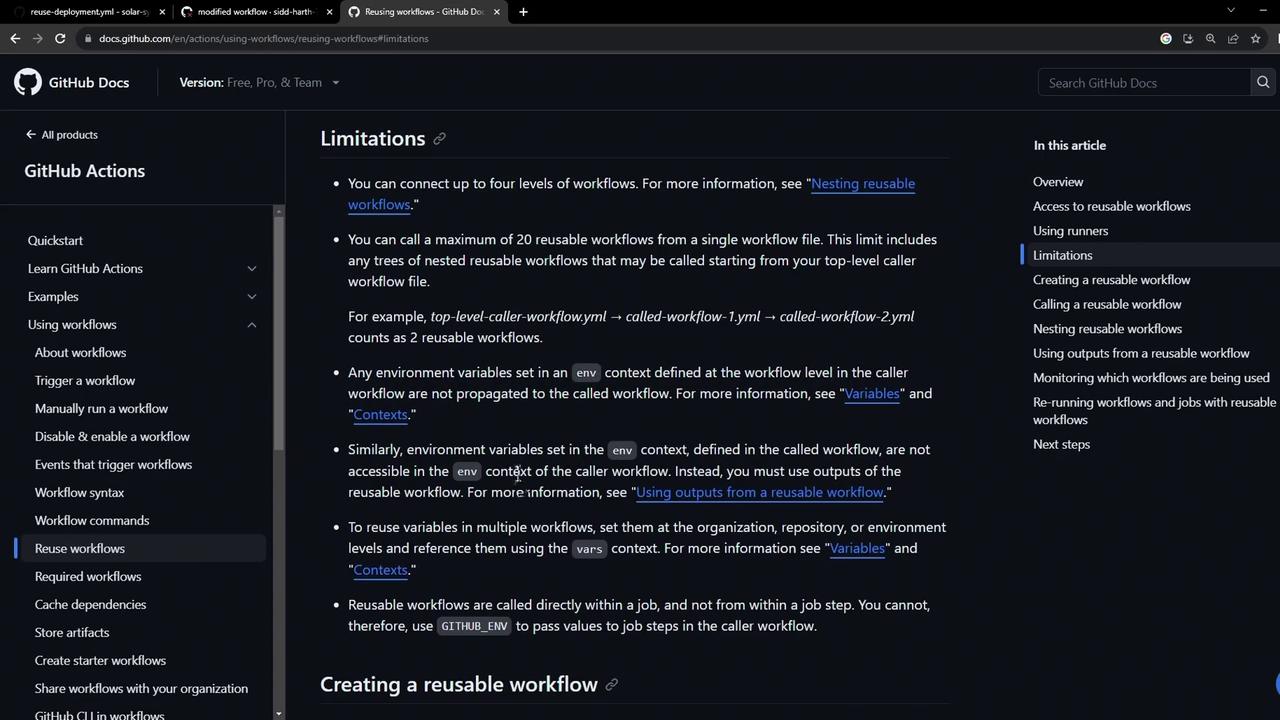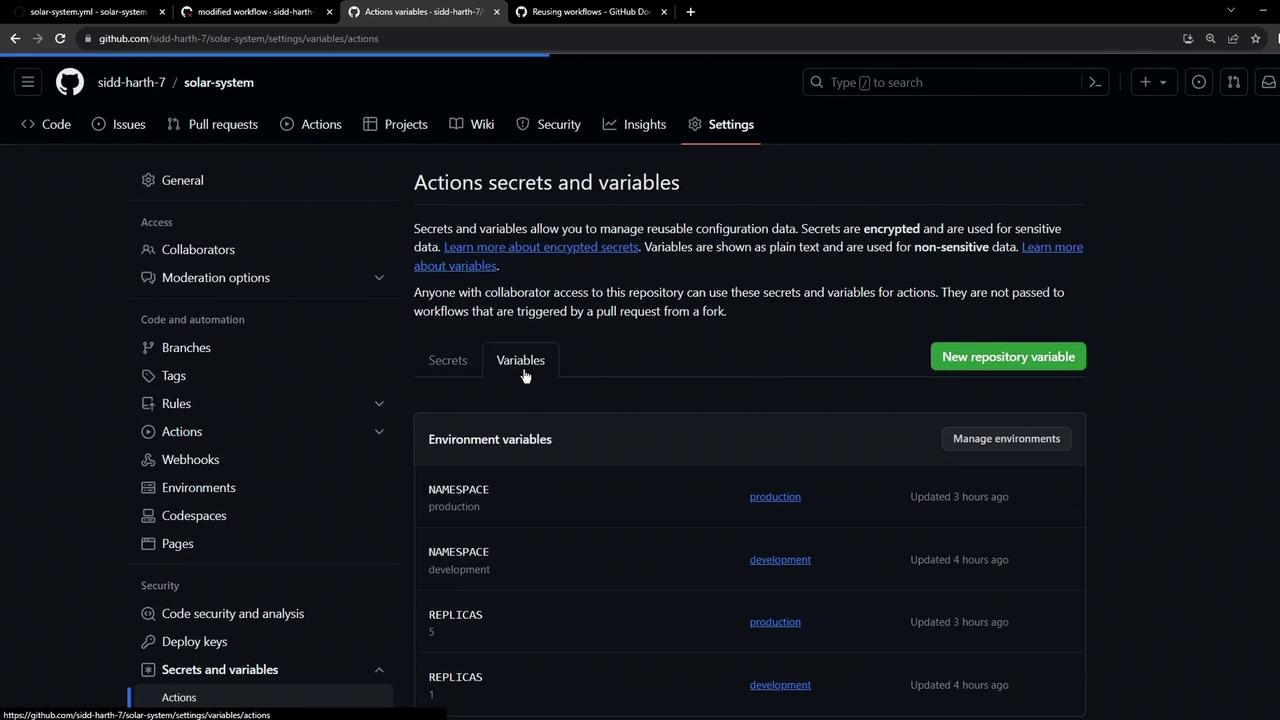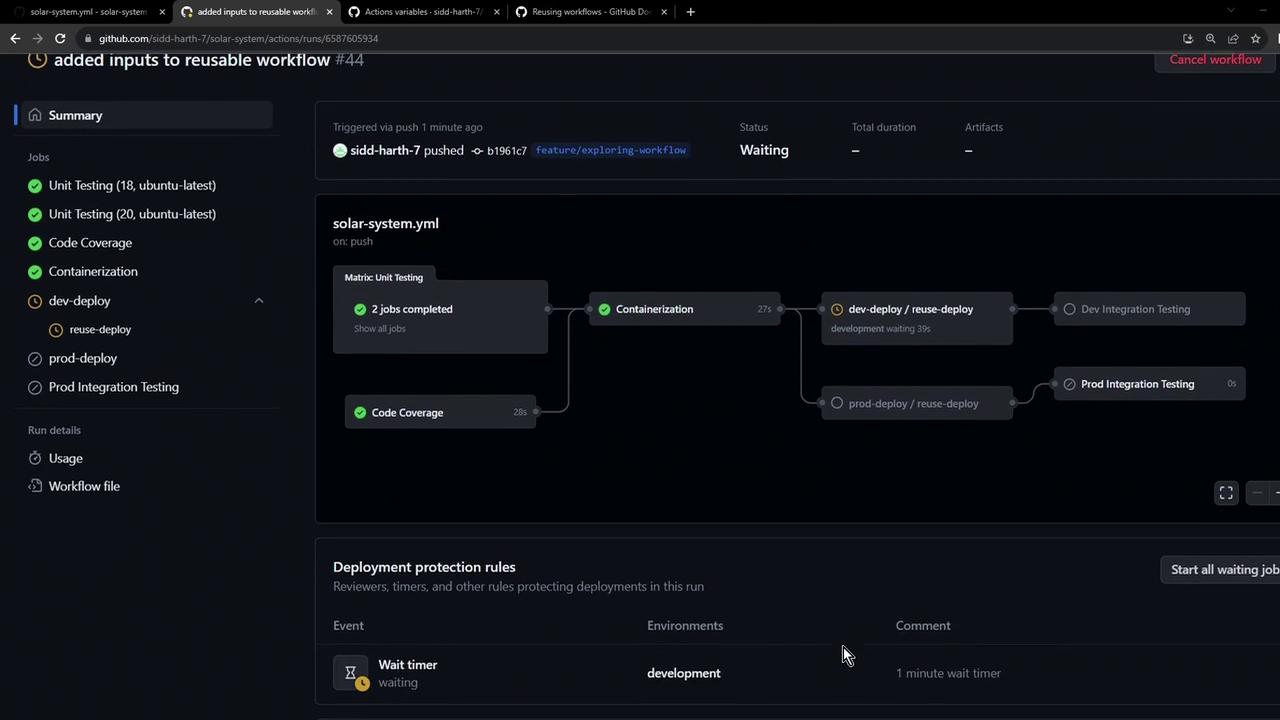GitHub Actions
Reusable Workflows and Reporting
Step 3 Using Inputs in Reusable Workflow
In this lesson, you’ll learn how to pass variables from a caller workflow into a reusable workflow using workflow_call inputs. By declaring inputs explicitly, you avoid the common pitfall where environment variables defined at the caller level don’t automatically propagate.
Prerequisite
Reusable workflows require GitHub Actions workflow_call. See the GitHub Actions Reusing Workflows guide for details.
The Problem: Empty Environment Variables
When you define environment variables in the caller workflow, they aren’t forwarded to the reusable workflow. For example, this secret creation command ran with an empty MONGO_URI:
kubectl -n development create secret generic mongo-db-creds \
--from-literal=MONGO_URI='' \
--from-literal=MONGO_USERNAME=superuser \
--from-literal=MONGO_PASSWORD='***' \
--save-config \
--dry-run=client \
-o yaml | kubectl apply -f -
Because MONGO_URI was never passed, the URI value remained blank:

To fix this, we define inputs in the reusable workflow and explicitly pass values from the caller.
Define an Input in the Reusable Workflow
Edit your reusable workflow (e.g. .github/workflows/reuse-deployment.yml) and add an inputs section under workflow_call. Here we declare a required string input mongodb-uri:
name: Deployment - Reusable Workflow
on:
workflow_call:
inputs:
mongodb-uri:
required: true
type: string
secrets:
k8s-kubeconfig:
required: true
mongodb-password:
required: true
jobs:
reuse-deploy:
environment:
name: development
url: https://${{ steps.set-ingress-host-address.outputs.APP_INGRESS_HOST }}
outputs:
APP_INGRESS_URL: ${{ steps.set-ingress-host-address.outputs.APP_INGRESS_HOST }}
runs-on: ubuntu-latest
steps:
- name: Checkout Repo
uses: actions/checkout@v4
- name: Install kubectl CLI
uses: azure/setup-kubectl@v3
with:
version: '1.26.0'
- name: Create MongoDB Secret
run: |
kubectl -n ${{ vars.NAMESPACE }} create secret generic mongo-db-creds \
--from-literal=MONGO_URI=${{ inputs.mongodb-uri }} \
--from-literal=MONGO_USERNAME=${{ vars.MONGO_USERNAME }} \
--from-literal=MONGO_PASSWORD=${{ secrets.mongodb-password }} \
--save-config \
--dry-run=client -o yaml | kubectl apply -f -
Notice how we replaced the hard-coded MONGO_URI with ${{ inputs.mongodb-uri }}.
Store the URI as a Repository Variable
In your repository settings under Settings › Actions › Variables, create a variable named mongo_uri:

- Name:
mongo_uri - Value:
mongodb+srv://supercluster.d8jjj.mongodb.net/superData
Note
Repository variables are not encrypted. Use Secrets for sensitive values like passwords.
Call the Reusable Workflow with Inputs
In your caller workflow (e.g. .github/workflows/solar-system.yml), remove the old env: block for MongoDB and invoke the reusable workflow using a with block:
name: Solar System Workflow
on:
workflow_dispatch:
push:
branches:
- main
- 'feature/*'
jobs:
# ... other jobs ...
dev-deploy:
needs: docker
if: contains(github.ref, 'feature/')
uses: ./.github/workflows/reuse-deployment.yml
with:
mongodb-uri: ${{ vars.mongo_uri }}
secrets:
k8s-kubeconfig: ${{ secrets.KUBECONFIG }}
mongodb-password: ${{ secrets.MONGO_PASSWORD }}
prod-deploy:
needs: docker
if: github.ref == 'refs/heads/main'
uses: ./.github/workflows/reuse-deployment.yml
with:
mongodb-uri: ${{ vars.mongo_uri }}
secrets:
k8s-kubeconfig: ${{ secrets.KUBECONFIG }}
mongodb-password: ${{ secrets.MONGO_PASSWORD }}
This ensures both development and production deployments receive the correct mongodb-uri.
Adding Dynamic Inputs
To make your reusable workflow more flexible, you can declare additional inputs—such as kubectl-version, k8s-manifest-dir, and environment. Update workflow_call like so:
on:
workflow_call:
inputs:
mongodb-uri:
required: true
type: string
kubectl-version:
description: Provide the required kubectl version
default: v1.26.0
required: false
type: string
k8s-manifest-dir:
description: Directory containing Kubernetes manifest files
default: kubernetes/
required: true
type: string
environment:
description: Deployment environment (e.g., dev, prod)
default: dev
required: true
type: string
secrets:
k8s-kubeconfig:
required: true
mongodb-password:
required: true
Table: Reusable Workflow Inputs
| Input Name | Description | Default | Required |
|---|---|---|---|
| mongodb-uri | MongoDB connection URI | — | true |
| kubectl-version | Version of kubectl to install | v1.26.0 | false |
| k8s-manifest-dir | Path to Kubernetes manifest directory | kubernetes/ | true |
| environment | Deployment environment (e.g., dev, prod) | dev | true |
Reference these inputs in your job steps:
jobs:
reuse-deploy:
environment: ${{ inputs.environment }}
runs-on: ubuntu-latest
steps:
- name: Install kubectl CLI
uses: azure/setup-kubectl@v3
with:
version: ${{ inputs.kubectl-version }}
- name: Replace tokens in manifests
uses: cschleiden/replace-tokens@v1
with:
tokenPrefix: '_'
tokenSuffix: '_'
files: '${{ inputs.k8s-manifest-dir }}/*.yaml'
- name: Create MongoDB Secret
run: |
kubectl -n ${{ vars.NAMESPACE }} create secret generic mongo-db-creds \
--from-literal=MONGO_URI=${{ inputs.mongodb-uri }} \
--from-literal=MONGO_USERNAME=${{ vars.MONGO_USERNAME }} \
--from-literal=MONGO_PASSWORD=${{ secrets.mongodb-password }} \
--save-config \
--dry-run=client -o yaml | kubectl apply -f -
- name: Deploy to ${{ inputs.environment }}
run: |
kubectl apply -f ${{ inputs.k8s-manifest-dir }}
And in the caller workflow, pass all required inputs:
dev-deploy:
uses: ./.github/workflows/reuse-deployment.yml
with:
mongodb-uri: ${{ vars.mongo_uri }}
environment: dev
kubectl-version: v1.26.0
k8s-manifest-dir: kubernetes/development/
secrets:
k8s-kubeconfig: ${{ secrets.KUBECONFIG }}
mongodb-password: ${{ secrets.MONGO_PASSWORD }}
prod-deploy:
uses: ./.github/workflows/reuse-deployment.yml
with:
mongodb-uri: ${{ vars.mongo_uri }}
environment: production
kubectl-version: v1.26.0
k8s-manifest-dir: kubernetes/production/
secrets:
k8s-kubeconfig: ${{ secrets.KUBECONFIG }}
mongodb-password: ${{ secrets.MONGO_PASSWORD }}
Best Practice
Keep input names consistent between caller and reusable workflows to minimize errors.
Verification in Workflow Run
When the workflow executes, you’ll see the passed inputs in the reusable job’s Inputs section:

mongodb-uri,kubectl-version,k8s-manifest-dir, andenvironmentare listed under Inputs.- The MongoDB secret is created with the correct URI.
- Manifests are applied from the specified directory.
- The deployment environment dynamically matches your input.
Next, we’ll explore how to propagate outputs from the reusable workflow back into the caller workflow for advanced chaining and reporting.
References
- GitHub Actions Reusing Workflows
- GitHub Actions Variables
- Azure/setup-kubectl Action
- cschleiden/replace-tokens Action
Watch Video
Watch video content